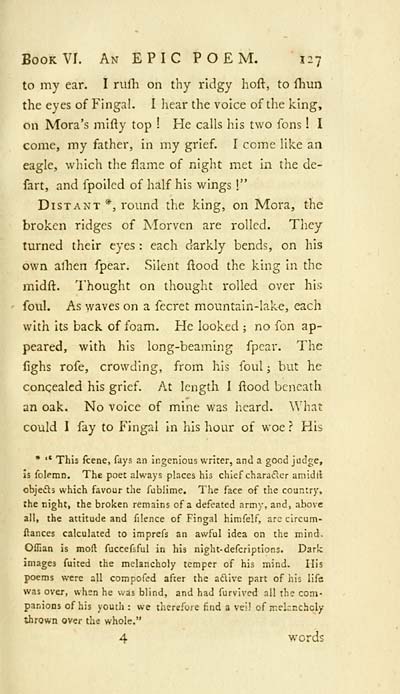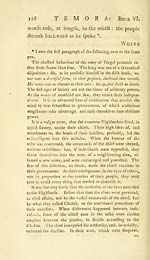Ossian Collection > Poems of Ossian > Volume 2
(141)
Download files
Complete book:
Individual page:
Thumbnail gallery: Grid view | List view

BookVI. An epic poem. 127
to my ear. I rulli on thy ridgy hoft, to fliun
the eyes of Fingal. I hear the voice of the king,
on Mora's mifly top ! He calls his two fons 1 I
come, my father, in my grief. I come like aa
eagle, which the flame of night met in the de-
fart, and fpolled of half his wings !"
Distant *, round the king, on Mora, the
broken ridges of Morven are rolled. They
turned their eyes : each darkly bends, on his
own allien fpear. Silent flood the king In the
midft. Thought on thouglit rolled over his
foul. As waves on a fecret mountain-lake, each
with Its back of foam. He looked ; no fon ap-
peared, with his long-beaming fpear. The
fighs rofe, crowding, from his foul j but he
concealed his grief. At length I flood beneath,
an oak. No voice of mine was heard. What
could I fay to Fingal In his hour of woe ? His
* '* This fcene, fays an ingenious writer, and a good judge,
IS folemn. The poet always places his chief chara(5ler amidll
objefts which favour the fublime. The face of the country,
the night, the broken remains of a defeated army, and, above
all, the attitude and filence of Fingal himfelf, arc circum-
ftances calculated to imprefs an awful idea on the mind.
Offian is moft fuccefsful in his night-defcriptions. Dark
images fuited the melancholy temper of his mind. His
poems were all compofed after the aflive part of his life
was over, when he was blind, and had furvived all the com-
panions of his youth : we therefore find a veil of melancholy
thrown over the whole."
4 words
to my ear. I rulli on thy ridgy hoft, to fliun
the eyes of Fingal. I hear the voice of the king,
on Mora's mifly top ! He calls his two fons 1 I
come, my father, in my grief. I come like aa
eagle, which the flame of night met in the de-
fart, and fpolled of half his wings !"
Distant *, round the king, on Mora, the
broken ridges of Morven are rolled. They
turned their eyes : each darkly bends, on his
own allien fpear. Silent flood the king In the
midft. Thought on thouglit rolled over his
foul. As waves on a fecret mountain-lake, each
with Its back of foam. He looked ; no fon ap-
peared, with his long-beaming fpear. The
fighs rofe, crowding, from his foul j but he
concealed his grief. At length I flood beneath,
an oak. No voice of mine was heard. What
could I fay to Fingal In his hour of woe ? His
* '* This fcene, fays an ingenious writer, and a good judge,
IS folemn. The poet always places his chief chara(5ler amidll
objefts which favour the fublime. The face of the country,
the night, the broken remains of a defeated army, and, above
all, the attitude and filence of Fingal himfelf, arc circum-
ftances calculated to imprefs an awful idea on the mind.
Offian is moft fuccefsful in his night-defcriptions. Dark
images fuited the melancholy temper of his mind. His
poems were all compofed after the aflive part of his life
was over, when he was blind, and had furvived all the com-
panions of his youth : we therefore find a veil of melancholy
thrown over the whole."
4 words
Set display mode to: Large image | Transcription
Images and transcriptions on this page, including medium image downloads, may be used under the Creative Commons Attribution 4.0 International Licence unless otherwise stated. ![]()
| Early Gaelic Book Collections > Ossian Collection > Poems of Ossian > Volume 2 > (141) |
|---|
| Permanent URL | https://digital.nls.uk/77478027 |
|---|
| Description | Volume II. |
|---|---|
| Shelfmark | Oss.20 |
| Attribution and copyright: |
|
| Description | "A new edition, carefully corrected, and greatly improved". (London: 1773.) In two volumes. |
|---|---|
| Shelfmark | Oss.19-20 |
| Additional NLS resources: | |
| Description | Selected books from the Ossian Collection of 327 volumes, originally assembled by J. Norman Methven of Perth. Different editions and translations of James MacPherson's epic poem 'Ossian', some with a map of the 'Kingdom of Connor'. Also secondary material relating to Ossianic poetry and the Ossian controversy. |
|---|
| Description | Selected items from five 'Special and Named Printed Collections'. Includes books in Gaelic and other Celtic languages, works about the Gaels, their languages, literature, culture and history. |
|---|

